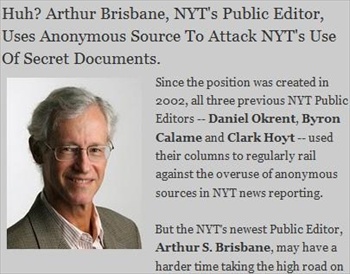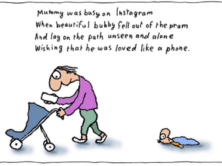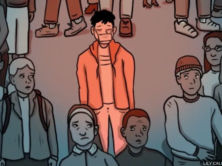
The NYT Picker called out the Times' public editor Arthur Brisbane for using an anonymous source in his column on WikiLeaks. (Credit: NYTPick, [screenshot detail])
The NYT Picker, a blog which “devotes itself exclusively” to analyzing the New York Times, sharply criticized the Times’ public editor Arthur Brisbane‘s most recent column on the newspaper’s relationship with whistleblower site WikiLeaks.
Specifically, the NYT Picker, which is anonymously written, criticized Brisbane for using anonymous sources, for making generalized statements and for “ignoring” the fact that the Times concurrently published its analysis of WikiLeaks documents with a negative profile of WikiLeaks founder Julian Assange.
A public editor using anonymous sources is odd, the NYT Picker noted, especially since Brisbane’s predecessor Clark Hoyt often criticized the paper for overusing and misusing of anonymous sources.
The anonymous source in Brisbane’s case is “a retired Army general, who asked for anonymity to avoid bringing controversy to the civilian organization he now serves,” quoted as saying “Analysis is not nearly as damaging as reports.”
That quote suggests WikiLeaks is more at fault than the Times for the document publication because the Times only provided analysis, whereas WikiLeaks offered almost 400,000 raw documents.
NYT Picker reported that it asked the first Times public editor, Daniel Okrent, about Brisbane’s anonymous source. Okrent reportedly wrote:
“I appreciate the importance of what you’re doing, but I’ve also sworn never to second-guess any of my successors, at least not publicly. I hope you’ll understand.”
While Brisbane did use that anonymous source, he also quoted many other people on the record. Brisbane’s sources were: Times executive editor Bill Keller, ProPublica editor Paul Steiger, Cardoza Law School professor David Rudenstine, Project for Excellence in Journalism’s Bill Kovach, and author Thomas E. Ricks.
NYT Picker also criticized the column for being “a wimpy, scattershot analysis of a serious controversy that produced widespread and serious attacks” on the newspaper.
Specifically, the NYT Picker accused Brisbane of generalizing his statement that the newspaper “faced some very tough decisions in this situation and took some risks.” According to the NYT Picker, he didn’t detail what those decisions and risks were.
However, iMediaEthics’ read of Brisbane’s column finds otherwise. Brisbane’s column listed some of the following “challenges” and “risks” the Times took in publishing WikiLeaks information. For example:
- “Managing its relationship with Mr. Assange and WikiLeaks”
- “The possibility that the government would strike back”
- Deciding if public interest is more important than the “risks to coalition forces and intelligence-gathering in the war zones”
- Ensuring the Times independently confirmed the information
- Keeping the documents “separate’ from Assange and his anonymous source
- Redacting identiying info
- Risk to reputation
Also, the NYT Picker slammed Brisbane for not fully addressing that while the Times published its WikiLeaks analysis, the Times also published a profile on WikiLeaks founder Julian Asasnge, viewed negative by some. Media critic Glenn Greenwald called it a “smear job”. (See more of Greenwald’s criticism here.)
While Brisbane didn’t highlight the contrast between the Times’ criticial profile of Assange and the Times’ publication of WikiLeaks analysis, he did mention a few times skepticism toward working with Assange.
iMediaEthics is writing Brisbane to ask if he has any comment to the NYTPicker’s criticism. We will update with any response.
UPDATE: 11/12/2010 10:46 AM EST: Joseph Burgess from the New York Times’ public editor office responded to iMediaEthics e-mail inquiry: “Thanks for writing us. As a rule of thumb, the public editor does not respond to comments or critiques made by the media. We believe the public editor’s columns stand on their own merits.”





Comments Terms and Conditions